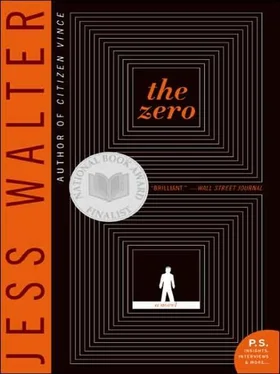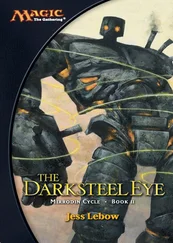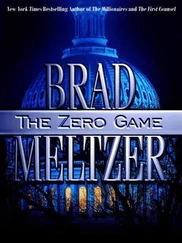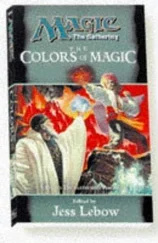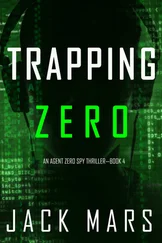“So what do you think?” Guterak came around the truck and stood next to Remy, gaping at it. He was wearing a suit without the tie and his hair was forcefully parted to the side. He seemed nervous. His voice seemed to disappear in the empty arena.
“Big truck,” Remy said.
“Yeah,” Paul said. “It’s pretty cool. Hey, thanks again for coming down.”
“Sure.”
“Impressive up close, isn’t it?” A woman was speaking behind them. Remy turned and saw her approach from an open door on the floor of the arena. She had curly brown hair, blonded at the tips, and wore a tight denim skirt, like a country music singer. A cell phone earpiece sat perched on her head as if she’d just walked away from a fast-food drive-through window.
When she was closer, the woman handed Guterak some papers. “Here you go, Paul. Countersigned contracts, as Michael promised. And the schedule for next week. Tractor pulls at seven each night, followed by the demos, and then before the finale we’re going to have a moment of silence. That’s where you come in.” The woman was in her thirties and her thin legs disappeared in elaborate cowboy boots. She smiled. “We’ll announce the Eagle Truck, Hero-One, and that’s when you come out with the firefighter-” She looked down at her notes. “ – Davie Ryan, both of you in uniform. The two of you walk out, wave to the people, look… you know… serious or whatever. Then you climb that staircase over there and stand on that platform in the dark. Take off your hats. We have a moment of silence and then Bam! The lights come up and we play ‘America the Beautiful’ and then Hero-One comes out. People go ape-shit and the truck runs over a bunch of shit and everyone goes home. Easy, right? I’ll bet it’s much easier than chasing bad guys.” The woman handed Paul a brochure, which he read and handed to Remy.
WE’RE TURNING VETERANS ARENA
INTO A GIANT MUD PIT
TO HONOR OUR DEAD HEROES!*
*Ten percent of all proceeds to go to the widows and orphans fund.
Tractor pulls, monster trucks, demolition derby!
And for the first time anywhere: The Eagle Truck, Hero-One
With its haunting display of airbrush artistry featuring America’s lost heroes.
“When do I talk?” Paul asked as he leafed through the program.
“Talk?” the woman asked. “About what?”
“Well.” Paul looked around the arena. “I don’t know. Maybe I misunderstood. I thought I was going to get to talk.”
“No, no.” The woman smiled. “We don’t need you to talk.”
“Oh. Yeah. See, I was under the impression that I would get to talk.”
“No. There’s no talking.”
Paul took a couple of steps and looked at the truck. “No. See that’s what I do… I talk. You know… about what I saw?”
“No,” she said. “No talking.” She leaned forward. “Honestly, I don’t think people want any more talking. For a while they did. But I think they’ve had enough of that kind of thing. I think we get it. No, all we need you to do is… look appropriate.” The woman shrugged, opened her handbag, and handed Paul an envelope. He held it for a moment before opening it.
While Guterak stared at his paycheck, Remy walked toward the truck and read the names, and indeed they were airbrushed with such artistry that the shadows seemed real and the letters had a disquieting depth. The names – all that was left of good people – rose like bruises from the metal-flake paint.
THE DOCUMENT looked just like Australia; in fact, in a way it was Australia, its edges burned into a perfect representation of the coastline, in that distinctive, thick oblong shape of the continent, bent in the middle, with a hole at the top corresponding perfectly with the Gulf of Carpentaria. Helpfully, someone had paper-clipped an actual map of Australia to the file; he glanced from the burned page to the map and then back again, and at the yellow flag on the plastic baggy in which the paper was placed: “Forward to SECURE. Isn’t this uncanny? Doesn’t it look like Australia? – SM.”
Remy looked around. He was back behind his desk. There was still nothing on the walls except the photo of him between The Boss and The President, nothing to make this office look like anyone actually worked here. He opened the top drawer, found a pen, and wrote, “Yes,” on the flag. Then, after a moment, he initialed it. Before that day, when it became Australia, the page had been a simple expense report from a lunch meeting between March Selios and a man named Bobby al-Zamil, identified as “vice pre-” (the rest burned away down near the Great Sandy Desert) of a business called “Feynman-Mid-Ea-” something (burned away down in the populous regions near Melbourne and Sydney).
Remy glanced around his office. He turned the nameplate around again, just to be sure. It said REMY. Good. He’d begun to feel he could manage the skips with nonchalance, and he thought it best to treat this burned piece of paper with the same knowing shrug. He picked up the phone and hit zero, and a few seconds later an operator’s voice came on line.
“This is Diane.”
“Uh. Hi. Diane. This is Brian Remy.” He looked around again. “I’ve got this piece of burned paper that looks like Australia. Am I supposed to do something with-”
“Let me see if I can get him on his car phone.”
A few minutes later, Remy heard the buzzing of a phone and Markham picked up, apparently in traffic. “Markham.”
“It’s Remy.”
“Hey, buddy. We’re just on our way back. So… did you get the Australia document I sent over? Isn’t that wild?”
“Yeah,” Remy said, holding it up again.
“I wanted you to see the original before the probability companies started fighting over it.”
“The probability companies?”
“Yeah. We’re getting bids already.”
“Bids?”
“You know, to study the burn patterns?” Markham just kept going, as if all Remy needed was a little more information and then the whole thing would click. “Applying models of randomness and linear motion probability to the patterns in paper burns?”
“I don’t-”
“You didn’t see the story in the Times ? The whole booming randomness industry… partial documentation recovery and interpretation… the old thought experiment about the drunkard’s walk?… Inevitability and random patterns, assuming unreversed trajectories and nonpreferred directionality? Applying that to burn patterns? You know.”
“No, I guess… I don’t-”
“The whole partials pedagogy… Jesus on a Fish Stick?”
Remy was afraid this would go on forever, and so he said, “Oh. Jesus on a Fish Stick. Sure. Look, do you need me to do anything with this?”
“No, I just wanted you to see it, that’s all. We got everything else handled. We’re on al-Zamil right now – should be ready to work him tonight.”
Something in Markham’s voice made Remy uneasy. “Work him?”
Markham laughed. “Would you relax. We’re following the protocols you wrote. We adopted ’em. No more sloppiness, I promise.”
“Wait. What protocols?”
Markham laughed again. “Come on, don’t test me. I swear: no more screwups.” Over the phone, Remy could hear a man saying something in Markham’s car, perhaps He’s moving . “Hey, I gotta go,” Markham said. “I’ll call you when we’re ready.”
“Wait!” Remy said, but Markham was gone. He dialed the operator again, but after a moment she came back on the phone and said that Markham was unavailable.
Remy hung up and looked down at his desk again. Had he written protocols? He tried the desk drawers but they were empty except for some blank paper, a letter opener, and a few pens. The big bottom file drawer was still locked. Remy yanked on it, then looked around the office for something to pry it open with. He tried the letter opener, but it just bent the metal blade. Wait – this was his office. Remy pulled his keys from his pocket, and separated a small one he didn’t remember having. The key turned the lock and he pulled the drawer back.
Читать дальше
